

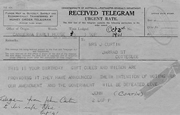
JCPML. Records of the Curtin Family. Telegram from John Curtin to Elsie Curtin, 3 October 1941. JCPML00402/38
Visits Fadden in his office to discuss the forthcoming vote on the budget. (The budget was voted down and Parliament adjourned).
[Fadden’s government had been placed in an untenable position and when his budget was presented to Parliament at the end of September, ‘the Labor caucus decided to test the Government’s support “by opposing it”on the basis of its burden not being fairly shared among the community. Curtin moved to amend the budget symbolically by reducing it by £1’. The budget was voted down, Mr Fadden called on the Govenor-General, Lord Gowrie, and submitted his resignation. After advising a party meeting he visited the Govenor-General himself to accept his commission.]
Makes statement as Prime Minister Designate on readiness to form government:
‘I am ready to form a Government. I am confident it will be a stable Government and I know it will devote itself with singleness of purpose to what is the undoubted desire of the Australian people - concentration on the prosecution of the war and the distribution of the inevitable burdens of the war over the whole community.’
Makes statement concerning the desirability of continuing the Advisory War Council.1
House of Representatives
Makes statement regarding administration of government:
‘I am not tearing up the roots of Australia in a day. There will be no dislocation of the machinery of government. The machinery of administration will continue uninterruptedly. Any decisions of the previous Government will stand, unless they are a cardinal affront to Labour policy.’ 2
Canberra
Chairs meeting of Federal Parliamentary Labor Party, which lasts three-and-a-half hours and elects the Curtin ministry.
House of Representatives
Makes statement as Prime Minister Elect:
‘The fighting men, backed by the whole resources of this country stand between us and the enemy and I am sure that, in entrusting this very vital portfolio to my deputy [Mr Forde] I am emphasizing to the nation the relationship which the new Government has to the conduct of the war.’
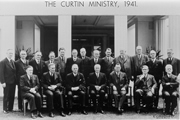
JCPML. Records of the Australian Labor Party WA Branch. The Curtin Ministry, 1941. JCPML00713/1
11 am. Attends swearing in of new federal ministry, and the first session of the new Cabinet.
Attends session of House of Representatives, where he announces that he has been chosen as head of the new Australian Government.
Travels to Sydney. Speaks in the Town Hall and gives his first public address as Prime Minister at the opening of the ₤1000,000,000 war loan campaign.
Speaks ‘to Australia’ and gives the people his ‘solemn pledge of a maximum war effort.’
‘To the applause of the crowd, he vowed that there would be “no half-heartedness” in carrying out his government’s pledge “to wage war”. Among the audience was his son, John, now a corporal in the air force, who “unconcernedly walked up to his father, shook his hand, and wished him every success with his war loan appeal.”’4
Makes statements on:
- Availability of railway rolling stock to British and Russian forces in Iran.
- Commonwealth Officers’ rights.
- Pensions for those who served in the Boer War.
- Conference in Washington on International Wheat Agreement.
- The release of Max Thomas and Harold Ratcliff on a bond.6
Makes short-wave radio broadcast:
‘”Let it be clear, as a warning to our enemies and solace to our friends that Australia’s war effort will be increased,” said the Prime Minister.’ 7
Arrives in Melbourne to be greeted at Spencer Street station by 'some five hundred trade unionists and Labor supporters.'
Declares that ‘they were welcoming him “not only as Labor Prime Minister, but as an Australian”, which he claimed were related impulses. “And now let me get to work,” he said as he moved through the crowd to his car.’
Makes statements on
- A report that Australian troops had landed in Russia.
- Italian propaganda.
- Insurance of Dutch Hospital ship Oranje.
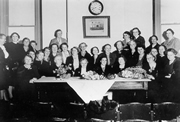
JCPML. Records of the Curtin Family. Fremantle Labor Women's Group (including Elsie Curtin) at Fremantle Trades Hall, celebrating John Curtin becoming Prime Minister, 14 October 1941. JCPML00376/161.
Additional information from photograph: Back Row L to R: Mrs G Fraser, Mrs J Tonkin, Mrs ?, below Mrs Hackett, above Mrs Sheerer, below Mrs Texas Green, Mrs E Bell, Mrs Orme, above, Mrs Hawkins, Mrs Oliver, (Senator) D M Tangney, Mrs Mann, R Thompson, Mrs Beisley, Mrs Laidlaw, above Mrs E McCallum & daughter, below Mrs Mannion, Mrs Jarvis, Mrs Merrilees above Mrs Jones, above Mrs Gilmour, below Mrs Wauhop, Mrs Sleeman Seated at table L to R: Mrs Waterhouse, Mrs Bates, Mrs J Ryan, Mrs J Curtin, Mrs Jackson, Mrs J Clark Fremantle Labour Women s Organisation - 1941 Dorothy Tangney was elected a Senator in 1943
Attends first Labor Cabinet meeting.10
Makes statements on:
- Men, materials and the war effort.
- The position in the Far East.
Makes statements on:
- Cohesion of democratic powers in the Pacific.
- Movements of shipping and delays.
Grants ‘three-minute’ interview to Mrs M A Huntress who had declared her ‘intention of 'doing anything” to draw attention to the plight of the pensioners.’
Announces reduction in air mail rates.
Discusses external communications with the Postmaster-General (Senator Ashley), and the Director-General of Post and Telegraphs (Mr D McVey).14Makes statements on:
- The standard of living.
- An increase in pay to members of the Royal Australian Navy auxiliary service and the Permanent Military Forces.
- The adoption of a recommendation by the Minister for Repatriation concerning the training and placement of ex-servicemen.
- The status of Sir Earle Page as accredited representative of the Australian Government to the British Government.15
Attends meeting of the War Cabinet, also attended by NZ Minister for Finance, Mr Nash.
Makes statements on:
- The proper approach from industrial labour interests, through the Australasian Council of Trade Unions and the Australian Workers Union.
- Conciliation machinery.
Makes statement regarding the publication of the report of the Western Australian War Industries Committee.
Confers with Leader of the Opposition in South Australia (Mr Richards) on coal stocks.17Announces that the Dean of the Faculty of Economics of Sydney University (Professor R C Mills) has been appointed Chairman of the Commonwealth Grants Commission.
Makes statements on:
- The Labour Government’s policy on the recruitment of women.
- The Australian war effort and capacity. Appointment of Production Executive.
- Invalid and old-age pensions.
Announces the award of the Victoria Cross to Private J H Gordon, 2/31 Battalion.20
Chairs meeting of Federal Parliamentary Labor Party. After introducing and welcoming Hon W Nash, Deputy Prime Minister of New Zealand to the meeting, and dealing with some business, the meeting was adjourned until 8 pm.
Meets Mrs Curtin
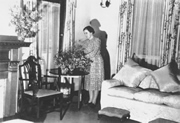
JCPML. Records of the J S Battye Library of West Australian History. Mrs Curtin at the Lodge, Canberra ca 1942. JCPML00139/45.
Courtesy J S Battye Library. BA499/45, 53457P
Is joined by Mrs Curtin at the Lodge.
Broadcasts summary of the 1941-42 budget statement.
8 pm - Chairs resumed meeting of Federal Parliamentary Labor Party.21Makes statements on:
- Nursing Services and Auxiliaries’ pay rates.
- The acquisition of a camp site for one armoured division of the AIF Armoured Division.
- Aid to Russia.
- Enlistment or university entrance for senior students.
- The Empire Air Scheme promotions.
- The flying of flags on Commonwealth buildings on 7 November, National Day of Russia.
- The rationalization of information services at the Australian Office in New York.
- A visit by Mr Leslie Blackwell, a member of the Parliament of the Union of South Africa.
- A grant to Sydney University for conduct of a school of training in radio-physics.
- The presence of the Hon W Nash, the New Zealand Minister for Finance, at meetings of the War Cabinet and War Council.22
Makes statements on:
- Service pay rates.
- The Far Eastern position.
- The commemoration of Armistice Day.
- The West Australian Industry Expansion Commission.
- Broadcasts (by radio- telephone) over the British Broadcasting Corporation network.23
Makes statements on:
- Advertising of luxury items.
- Answering criticism of the budget by the Financial News.
- The return of General Sir Thomas Blamey to Australia for consultations.
- A review of rents and of government opposition to profiteering in rents.
- Seeking advice on economic subjects from Professor D B Copland, Prices Commissioner.25
Confirms that General Sir Thomas Blamey will be in Canberra on 11 November.
Makes statements on:
- Seeking advice on economic subjects from Professor D B Copland, Prices Commissioner.
- A conference in Canberra on 10 November, between representatives of the Government, the Commonwealth Bank and representatives of private trading banks.
- The decision not to fill the office of Chief Migration Officer on the return to Australia of Mr R H Wheeler.
- The establishment of a reserve stock of cotton yarn.
- Vocational training for repatriated service personnel.
- The airgraph service.
- The egg contract and the export of egg pulp to the United Kingdom.
- An invitation to the Prime Minister of Burma (Hon U Saw) to be the guest of the Commonwealth while in Australia on his way to Burma.26
Makes statements on:
- There being no connection between the return of General Sir Thomas Blamey and the recall of the AIF, and indicating that the Government had no intention of recalling the AIF.
- The secrecy of movements of naval vessels.
- The shipping position.
- Wheat Pool Payments.
- Unemployed insurance.
- Leave of absence granted to officers of the Commonwealth Public Service who are members of the Volunteer Defence Corps.
In Parliament:
- Answers a question concerning the Armoured Division and whether a "partially equipped" mechanised division would be sent abroad.
- Makes statement on the qualifications of Sir Bertram Stevens.27
Discusses the revised 1941-42 Budget in his position as Prime Minister, outlines the philosophy behind the government’s decision to increase taxation, particularly with respect to the wealthy, and to adjust the payment provisions for servicemen. Also discusses the government’s attitude and plans with respect to the Commonwealth and private banks and to those companies and individuals who will profit from the war.
Makes statements on:
- The war effort and capacity, and the establishment of a Commonwealth Production Executive.
- Casualties of Australian forces since the outbreak of war.
In Parliament:
- Explains new position regarding the Inventions Board.
- Makes statement on composition of Trade Unions Advisory Panel.
- Receives, with the Minister for External Affairs (Dr Evatt), the Chancellor of the Duchy of Lancaster (the Right Honorable A Duff Cooper, DSO).28
Attends meeting of the Advisory War Council with Mr Duff Cooper.
‘The whole question of the position in the Far East was surveyed. Mr. Duff Cooper spoke frankly and comprehensively, giving us his detailed knowledge of the facts.’
Makes statement on the delayed arrival of Mr. Leslie Blackwell, MP, of South Africa.29Attends conference between the Treasurer (Mr Chifley), the governor of the Commonwealth Bank Board (Sir Claude Reading), the governor of the Commonwealth Bank (Mr H T Armitage) and representatives of private trading banks.
Makes statement answering criticism by The Economist.
Reports on a conference with private banks.30Speaks at the opening of the ‘grim memorial to the fallen of the First World War.
The memorial, set on the banks of the Molonglo River could be seen by parliamentarians leaving Parliament House. “This counterposing of the war memorial opposite parliament would ensure, said Curtin, that parliament was “inspired and strengthened in the performance of its great duties by the ever-present opportunity to contemplate the story that has gone before,” and “would keep alive the unquenchable spirit of sacrifice and service which were the cornerstones of a people’s greatness.”’
Delivers Prime Minister’s Armistice Day message.
Makes statement detailing message of thanks for hospitality from the New Zealand Minister for Finance (Mr Nash).31
Makes statements on:
- Policy regarding Coal Commission.
- The appointment of Mr W C Taylor, of Sydney, to the vacancy on the Commonwealth Bank Board.
- Taking steps to acquire a report on the operations of the Eastern Supply Council.
- Changes to the personnel of Parliamentary Committees.32
10.30 am? – 12.50 pm. Chairs meeting of Federal Parliamentary Labor Party, and gives a ‘resume of position generally as regards defense etc.’
Makes statements on:
- The appointment of Mr E H Bourne to the vacancy on the Board of Amalgamated Wireless (Australasia) Limited caused by the death of Mr J D Millen.
- The disallowance of statutory rules relating to the coal-mining industry.
- Declining request by Mr Holt for Right Hon A Duff Cooper and General Sir Thomas Blamey to address members at an informal meeting of Parliament, or at a secret session.
- Cabinet decision to extend the term of service of members of the Australian Broadcasting Commission until 30 June, 1942.
- The terms of reference under which the recently appointed Western Australian Expansion Commission would function.
- The Cabinet decision that the Minister for Supply (Mr Beasley) should prepare a report on the representative on the Eastern Group Supply Council, and on an erroneous report in the press that Cabinet had decided to recall Sir Bertram Stevens for consultation.33
Makes National Broadcast on recruiting, and appeals to Australian men to volunteer. Gives his vision of Australia:
‘…a land of cities and golden plains, of great rivers and vast spaces. It is a land in which countless thousands of plain, ordinary men and women have toiled long, mostly for little reward; who sacrificed and built our heritage.’
Sends letter on cooperation by unions, to E. Thornton, General Secretary of the Federated Ironworkers' Association of Australia.
Makes statements on:
- Increase in price of petrol.
- The AIF fighting as a unified body.34
Makes statements on:
- The success of £100,000,000 War and Conversion Loan.
- An increase in the number of observer pupils for the Empire air training scheme.
- The relationship between Australia and China and the position of Chinese nationals in Australia.
- The decision that, to conserve paper stocks and avoid unnecessary expenditure, no member of the Commonwealth Ministry would issue Christmas cards.
- Meeting members of the Netherlands East Indies trade mission.35
Responds to a comment by Mr McEwen in respect of an industrial relations matter.
Makes statements on:
- The price of tea.
- Australian Imperial Force parties involvement in recruiting for services.
- Investigation into complaints by Agent General on the treatment of servicemen by Australia House.
- Tasmanian War Industries.
- Message by the Prime Minister to Unions, concerning industrial relations. 36
10.30 am? – 1.20 pm. Chairs meeting of Federal Parliamentary Labor Party at which:
‘On the suggestion by Mr Curtin it was decided That this Party expresses its deep regret at the death of the Hon J C Watson its first leader, and the first Prime Minister; also records its appreciation of his distinguished services to Labor and to Australia and tenders its profound sympathy to his bereaved family.’
[John Christian Watson 1867-1941 was an active unionist, becoming president of the TLC in 1892. He won the NSW State seat of Young in 1894 becoming “an accomplished and diligent parliamentarian”. He entered federal politics in 1901 winning the House of Representatives seat of Bland in 1901. He was Prime Minister from 27 April to 18 August 1904, and subsequently Leader of the Opposition. The seat of Bland was abolished in a redistribution, and at the election of 1906 Watson won the seat of South Sydney. He resigned as leader in October 1907, and did not contest the election of April 1910. After leaving Parliament Watson continued to work actively for the Labor Party, and formed an association with John Curtin, who was one of the pallbearers at Watson’s funeral.]
Gives press conference and warns that the conscription issue was a ‘recipe for repeating the disunity of the First World War.’
Broadcasts ‘a stirring “Tobruk Day” recruitment appeal.’
Mr Curtin said, “There was only one clear road to victory and peace – the road of service, either in the fighting forces or in the factories.”
Makes statements on:
- Cooperation between military forces and the Air Force.
- Conscription.
- Air raid precautions and arrangements with States.
- The price of butter.
- Comments by the Premier of Victoria, Mr Dunstan, and price control.37
Responds to questions from members of the Opposition on issues relating to the war, including the right of people to speak against conscription, the sending of a mission to Russia, and Australia’s war effort.
Makes further statement on conscription.
Makes statements on:
- Review of price control by the Premiers’ Conference.
- Sport in war-time.
- Setting up a Parliamentary Committee on wartime profits tax legislation.
- Refuting suggestions there had been hitches in Lease-Lend negotiations between the United States and Australia, caused by the change of Government in Australia.39
Makes statements on:
- An appeal for cooperation from the Central Council, Australian Coal and Shale Employees' Federation, Sydney.
- An investigation into the economic position of Tasmania as affected by conditions arising from the war.
- The protocol for the use of the letters BEM by those awarded the British Empire Medal.41
10.30 am? – 12.45 pm. Chairs meeting of Federal Parliamentary Labor Party.
Makes statement on National Security (Wartime Banking Control) Regulations.42Makes statements on:
- An application for an increase in the price of butter.
- The state of the war.43
Makes statements on:
- Women's organizations within the Defence Services for whom uniforms have been authorized.
- German propaganda and the AIF fighting as a unified body.
- Conscription and propaganda by the enemy.44
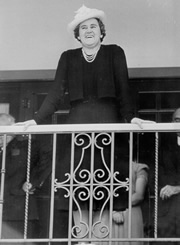
JCPML. Records of the Curtin Family. Mrs Curtin speaking from balcony at the Lodge at opening of garden fete in aid of Canberra Hospital Auxilliary Fund, 29 November 1941. JCPML00376/31
Attends emergency meeting of War Cabinet held in view of Japan’s ‘increasing belligerence.’
Makes statements on:
- Australian station of war.
- Further statement on loss of HMAS Sydney.
- Replacement of HMAS Sydney.47
Makes statements on:
- Reconstruction of National Oil Proprietary Limited.
- Fund opened by Lord Mayor of Sydney for a new HMAS Sydney.
- Christmas spending.
- Concession fares for Australian members of the Mercantile Marine serving on overseas ships.
- Cabinet decision to appoint Mr A W Coles, MHR, to the vacancy on the Commonwealth War Workers Housing Trust.
- Postal voting for members of services.
Mrs Curtin returns to Western Australia.
Leaves on the overnight train to Melbourne to prepare for a war cabinet meeting with the chiefs of staff.48Makes statements on:
- Action between HMAS Sydney and German raider Kormoran.
- Torpedoing and sinking of HMAS Parramatta.49
Attends War Cabinet meeting.
Denies that General Sir Thomas Blamey had received orders from the Australian Government to ship the Australian Imperial Force back to Australia.
Makes statement on the review by the War Cabinet of the Far Eastern position.50Attends War Cabinet meeting.
Cancels plans to return by overnight train to Canberra due to the deteriorating war situation. [A Japanese convoy had been spotted leaving Indochina, suggesting that war was imminent.]
Makes statements on:
- Strategic road construction.
- The employment of full-time duty personnel with the Volunteer Defence Corps.
- A discussion by War Cabinet on provision of respirators for the civil population.
- A request by Qantas Empire Airways Limited for the return of one flying boat, of those chartered by the Royal Australian Air Force.
- Approval by War Cabinet to the employment in the RAAF medical service of women doctors, ‘not exceeding a total of eight.51
Visits friends - members of the Bruce and Ovenden families - in East Melbourne.
Stayed in touch with the ‘developing crisis’ but appeared ‘restless and terribly distracted’. There was no telephone at the house and having (unusually) travelled in his official car, he sent the driver back for the latest news. On its return ‘Curtin told his friends, “I’ve got to go back. Big things are happening. I’ll know within an hour or so.”'52
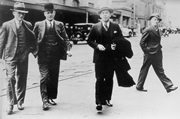
JCPML. Records of the Curtin Family. Eric Tonkin, John Curtin and Don K Rodgers, Adelaide 1937. JCPML00376/156
Japanese attack on Pearl Harbour just before 8 am.
At Victoria Hotel, when awakened by Don Rodgers and told of the attack on Pearl Harbour, replies ‘Well it has come.’
[Don K Rodgers (1906-1978) was John Curtin’s long-serving press secretary. He worked as a journalist on the Newcastle Morning Herald, Miners Advocate and the Newcastle Sun and joined the Labor Daily in Sydney in 1931 becoming an accomplished political reporter. In September 1937 he was seconded to assist John Curtin in campaigning for a federal election. They ‘hit it off’ and he accepted a permanent post as Curtin’s publicity officer (later press secretary). Rodgers frequently travelled with Curtin by train, often sharing sleeping accommodation with him. He took long walks with Curtin ‘during his fits of melancholia, lifting the prime minister’s mood with disquisitions on reform programmes.’ After Curtin’s death Rodgers worked as press secretary to Chifley and also worked briefly for H V Evatt.]
Attends War Cabinet meeting at which Chiefs of Staff report on the latest news.
Speaks at public meeting to raise money to replace HMAS Sydney. Calls for an ‘all in’ war effort ‘to resist those who would destroy our title to Australia,’ and ‘overthrow British authority in the Pacific.’
Appealing to his audience with a potent blend of religion and racism, Curtin proclaimed that it was “now up to us to hold what God has given to us and maintain the traditions that have been born into our manhood”. He called for workers to forego their holidays and for employers to provide an example by not going to “golfing parties” when their workers had to stay in their jobs.’
Broadcasts to the nation:
‘Men and women of Australia
…The call is to you for your courage, your physical and mental ability, your inflexible determination that we as a nation of free people shall survive … [Australia is now] the stake of this conflict.’
Attends ‘momentous’ Federal Cabinet meeting ‘to hear the news of Japanese aggression against the United States and Britain, and to decide upon Australia’s course of action’.
Prime Minister Curtin’s demeanour throughout was calm, and he impressed the members of the Press Conference by his handling of the situation.
Makes speech at the Victorian launching of the New Sydney Fund and made a ‘stirring appeal’ for an ‘all-in’ war effort.
Announces that ‘no private citizen must now proceed on holiday’, a statement he revises, asking Australians ‘to consider the welfare of the nation’ before taking holidays.
Makes statement on war with Japan.
Makes national broadcast appealing to the nation:
‘…for full cooperation in the hour of peril. “We are at war,” he said, “as a result of an unprovoked attack by Japan, and our vital interests are imperilled.” Lest there be some who may not realise the extreme seriousness of the position, Mr Curtin briefly sketched the progress of negotiations for peace, and then instanced the treacherous war that had been begun by an enemy “like an assassin in the night.”’
Attends meeting of the War Cabinet.54
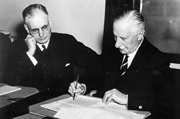
JCPML. Records of the Curtin Family. PM John Curtin watching Lord Gowrie signing declaration of war on Japan, December 1941. JCPML00449/5
With Lord Gowrie, Governor-General, signs proclamation declaring a state of war exists between Australia and Japan.
Requests Premiers from all States to attend a meeting in Canberra on Friday 19 December.
Makes statement on the loss of HMS Prince of Wales and HMS Repulse.56
Makes statement on:
- The appointment of the Minister for War Organization of Industry (Mr. Dedman) to the War Cabinet.
- Cabinet decisions which are ‘the first instalment of a complete revision of the whole Australian economic, domestic and industrial life’.
Addresses Royal Automobile Club of Victoria luncheon, at which a cheque for £5,000 is presented to the Government.57
Sends, via Dr Evatt, formal communication to USA Government concerning the declaration of war by the Commonwealth of Australia against Japan and receives response from President Roosevelt.
Makes statements on:
- Formation of the Coal Commission to control the supply, production, distribution and other matters affecting coal.
- The decision that Christmas Day, Boxing Day and New Year's Day are the only days on which holidays may be observed.
- Cabinet decision that the Minister in charge of a Service Department may approve of urgent defence measures which, owing to the time factor, cannot be submitted through the usual channels for approval.58
Returns to Canberra.
Receives visit from the Minister for the United States, Mr Johnson.
Makes statement on decision of Full Cabinet to approve extra allocation of money to cover urgent measures by State Premiers following the granting of special powers.59Makes statements on:
- Cabinet decision to approve of an allocation of money to provide air raid precaution measures in Commonwealth-owned establishments.
- Full Cabinet decision to approve of the extensive employment of women in industries where men were not available in sufficient numbers.60
Chairs meeting of Federal Parliamentary Labor Party.
Following events in Singapore and at Pearl Harbour, outlines the actions of the Government in response to these changes in international relations and seeks support from all parties for these actions. Comments specifically on Australia’s defence capability and outlines plans to improve that capability through increased manpower, improved support facilities, munitions etc.
Proposes motion:
‘That this House approves of the action of His Majesty's Government in the Commonwealth in having advised the issue of proclamations declaring the existence of a state of war with Japan, Finland, Hungary and Rumania. Further, this House hereby pledges itself to take every step deemed necessary to defend this Commonwealth and its territories, to carry on hostilities in association with our allies and to achieve final victory over our enemies.’
Makes statements on:
- Holidays and late shopping.
- Permitting the entry of Greek nationals into Australia, ‘as a gesture in recognition of the gallant service rendered by the Greek nation to the Allied cause.'61
Approves declaration of war on Japan.
Makes statements on:
- Restrictions on holidays.
- Role of Advisory War Council and full cooperation of Opposition.
- Early closing of shops.
- Review of position of primary industry.
Chairs meeting of Federal Parliamentary Labor Party.
Meets with Premiers of all States.
Makes statements on:
- Restrictions in taking annual leave.
- Expenditure on Air Raid Precautions in Government factories.
- United Kingdom and Australian representation in Singapore.
- War Cabinet decision to approve additional funds for the local manufacture of Gipsy Major Aircraft engines.
- War Cabinet decision to approve funds for purchase of vehicles and equipment for the mechanical transport column operating between Alice Springs and Larrimah, Central Australia.
- War Cabinet approval of conditions and rates of pay for the Australian Army Women's Service.
- War Cabinet approval of the second stage of the ship-building programme.
- Service Pay Rates, Dependants’ Allowances.64
Makes statements on:
- Regulations and cooperation of the nation in time of war.
- Elimination of mid-week sport as from 1 January, 1942.
- Compensation in respect of civilians killed or injured.
- On article by The Economist.
- Institution of daylight saving.
- Employment of alien doctors.66
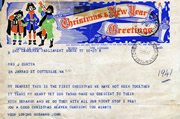
JCPML. Records of the Curtin Family. Telegram from John Curtin to Elsie Curtin, 23 December 1941. JCPML00402/39
Stays in bed until 11 am.
Spends Christmas in Canberra, separated from his wife and family. Works on Christmas Day, but entertains half a dozen West Australian airmen for lunch.
‘Thanking Curtin for his gesture, the airmen hailed him as “the living voice of freedom” and wished him “the very best health to sustain your robust mentality to meet the onerous trials of 1942.”' 68
‘Australia must be prepared for the bombing and shelling of its cities, the Prime Minister, Mr Curtin, said tonight.
It must be realised that Australia, if attacked by Japan, had not the forces to guard all its people from bombing and shelling; but it had the courage, the determination and the capacity to beat off the invader in the end.’
Replies to a further statement by The Economist.69
Provides the Melbourne Herald with a New Year message to the Australian people, which contained statements which would ‘resound around the world, causing Churchill to be outraged and Roosevelt to suggest that it smacked of “panic and disloyalty.”’
[‘The statement has since come to be regarded popularly as marking the point at which Australia came of age, breaking free of the historic bonds of empire to seek its salvation with the Americans.’]
Makes statement entitled ‘State of the War: Facing 1942’.70Makes statement on holidays and annual leave.
Clarifies statement made on 27 December, in reply to the Leader of the United Australia party, Mr. Hughes:
‘My statement means that Australia, as a part of the British Commonwealth, has to face the strategic problems of its own defence with sheer realism. We want to preserve Australia as a part of the British Commonwealth of Nations. We intend to do so.’71